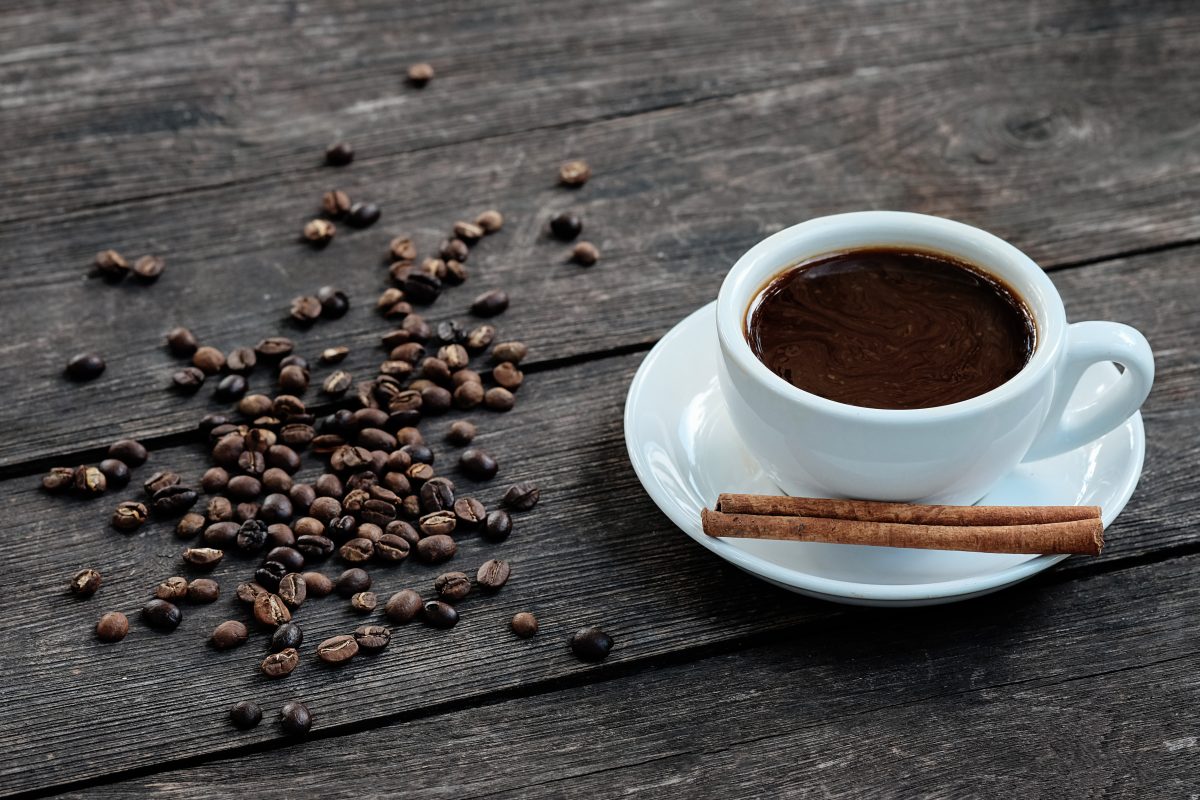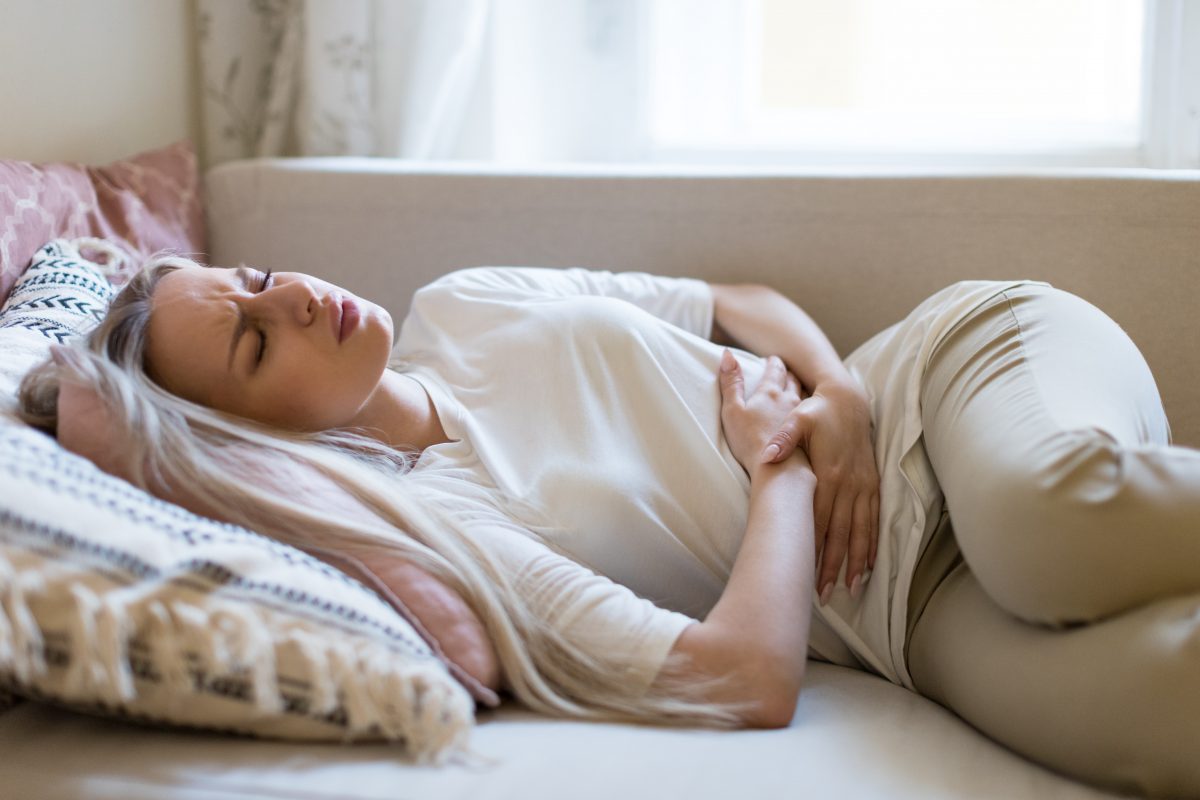Caffeine & IBS – what you need to know
- Dietary Advice (non Low FODMAP)
In this post, we will explain the connection between caffeine and IBS.
For many IBS sufferers, caffeine is a trigger, but does it mean you have to quit it? Luckily no.
But as there is no general recommendation for caffeine intake for people with IBS, we wrote several tips to help you get your symptoms under control.

What is caffeine?
Caffeine is a natural stimulant drug that affects the central nervous system, leading to increased alertness and reduced fatigue (1).
Caffeine is naturally present in several plants. Most well-known sources of caffeine include (1):
- Coffee beans
- Cacao beans
- Guarana
- Tea leaves
Caffeine and IBS
Observational studies suggest caffeine is a common IBS trigger (2, 3, 4). In one study with 390 participants, 39% reported that their IBS symptoms were related to drinking coffee (2).
Research also found the association between caffeine consumption and severity of IBS symptoms in overweight and obese people (5).
Unfortunately, besides the correlation, why this happens is not well understood.
However, there are several suggestions on how caffeine impacts IBS symptoms, such as abdominal pain, diarrhea, and gas (6).
Caffeine stimulates the gastrointestinal tract, potentially leading to increased bowel movements. For some people with IBS, especially those with IBS-D, this can worsen their symptoms (7).
To learn more about IBS-D, read our post: What is IBS-D and how can you manage it?
Another explanation is that coffee enhances the contraction of intestinal and colonic muscles, potentially resulting in an upset stomach (8, 9).
The third reason is the possible impact of caffeine on mental health and anxiety, but the studies are limited.
The effect of caffeine also depends on the dose and whether we are a fast or slow caffeine metabolizer (which is genetically predisposed).
Can you drink coffee if you have IBS?
Yes, you can! But how much coffee you can drink differs from person to person.
For the general population, the allowed daily intake is up to 400 mg, which is between 6 and 7 espresso coffees (10, 11). However, there are no specific guidelines for caffeine intake in people with IBS.
The British Dietetic Association suggests assessing caffeine intake and symptoms (if there are any) and accordingly reducing caffeine intake (12).
If you have your coffee with milk and a sweetener, consider a low FODMAP version if you suspect coffee might trigger your symptoms.
To read more about coffee and IBS and which low FODMAP coffees you can get in Starbucks, read our post: Does coffee trigger IBS?
Can quitting caffeine help IBS?
There is no need to quit caffeine to help IBS. To get improvements, gradually reduce the intake and monitor how you feel.
Also, avoid caffeinated drinks in the afternoon and evening as caffeine can interfere with sleep, and getting adequate rest is essential for managing IBS symptoms.
If you are considering quitting caffeine as part of your IBS management strategy, it is advisable to do so gradually to minimize potential withdrawal symptoms, such as headaches and fatigue.
Consulting with a healthcare provider or a registered dietitian can help you make informed decisions about managing your caffeine intake and its impact on your IBS symptoms.
Can coffee cause bloating in people with IBS?
Coffee can cause bloating in people with IBS due to:
- Production of the stomach acid (13)
- Increase in colonic movement (8, 9)
- A vicious cycle of caffeine, poor sleep, and anxiety
Coffee can also cause bloating in people with IBS due to FODMAPs. Black coffee is FODMAP friendly, but high FODMAP ingredients like milk can make it high FODMAP (14).
Check which low FODMAP milk options are IBS friendlier.
Other FODMAPs in coffee may come from sweeteners like honey.
To learn about low FODMAP sweeteners, read our post: Which sweeteners are low FODMAP?

Alternatives to coffee for IBS sufferers
One of the alternatives to regular coffee is decaf coffee, which has a milder effect on gastrointestinal motility.
One small study compared the effect on gastrointestinal motility, and its findings showed regular coffee has a 23% stronger effect on colonic movement than decaffeinated coffee (15).
Another alternative is green tea. One cup contains approximately 30 mg of caffeine, but you can also opt for a decaffeinated version (16).
Other IBS friendly hot drinks include hot cocoa (prepared with low FODMAP milk) or herbal teas. To learn more about teas for IBS, read our post: What are the best teas for IBS.
Decaf coffee and IBS
As mentioned above, decaf coffee is an alternative to regular coffee to reduce caffeine intake. But caffeine is not the only substance in coffee that stimulates bowels, suggests a study (15).
If you choose decaf coffee over regular coffee and still get uncomfortable symptoms, try other alternatives.
Summary
Caffeine is a natural substance found in coffee beans, cacao beans, tea leaves and others.
Caffeine can trigger symptoms like loose stools and flatulence in people with IBS. Moreover, caffeine can worsen anxiety and impact sleep, making it a vicious cycle.
While caffeine can be problematic for some IBS sufferers, it is essential to remember that everyone’s tolerance and triggers are unique.
If you decide to cut down caffeine intake, reduce it gradually to avoid withdrawal symptoms.
Written by Barbara Lešnik, Student Dietitian, reviewed by Kirsten Jackson, Consultant Dietitian BSc Hons, RD, PG Cert